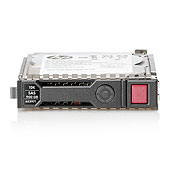New Solid State Drives for HP Servers
 In September, our company began supplying the second generation of solid state drives (SSDs) for HP Proliant servers. In the year that has passed since the first implementation of SSD in HP servers, several opportunities have appeared to circumvent the shortcomings of this technology, which still make its path to the hearts of mass customers so thorny.
In September, our company began supplying the second generation of solid state drives (SSDs) for HP Proliant servers. In the year that has passed since the first implementation of SSD in HP servers, several opportunities have appeared to circumvent the shortcomings of this technology, which still make its path to the hearts of mass customers so thorny. The first of the drawbacks is that per gigabyte of data, solid state drives today are significantly more expensive than conventional hard drives. This growth disease can be treated only in one way - by increasing the recording density and disk production. This is what we did: now we have 60 and 120 GB disks in our arsenal.
The second drawback of SSDs is the lower maximum number of read / write cycles than magnetic hard drives, which is especially hard on devices serving applications with intensive data processing.
To delay the drive’s failure, disk manufacturers today implement algorithms for even load distribution between memory cells at the microcode level, and also recommend purchasing disks with a capacity reserve and using them only where data is read mostly (real-time analysis of financial transaction data, CAD, 3D, etc.).
Joining these recommendations, we at the same time switched to a three-gigabyte SATA interface. This, in addition to a pleasant twofold increase in input / output speed, allowed the use of hot-swappable drives. This will allow our customers to finally use SSDs for mission-critical applications, without fear of data loss.
In addition, the new drives are available in the 2.5-inch and 3.5-inch form factor form factor, standard for the HP ProLiant Universal Drive Carrier (UDC), so they can be used not only in blades, but also in most other HP models ProLiant G6 and G5, supporting UDC, as well as some HP Integrity models.
Actually the filling of the disks is made by Samsung Electronics. But since we are launching them on the market under our own brand, it has been thoroughly tested by HP engineers for several months. Therefore, today SSD drive reliability is approaching high-speed SAS drives . At the same time, they have SSD-specific advantages, which give greater scope for the conditions of their use: expanded operating temperature ranges (0-60 ° C instead of the usual 10-35 ° C), less heat and resistance to shock and vibration.
Other details can be found at hp.com/go/solidstate/ .
In the meantime, tell me, do you think that the SSD technology has any other drawbacks and advantages that we have not mentioned?
